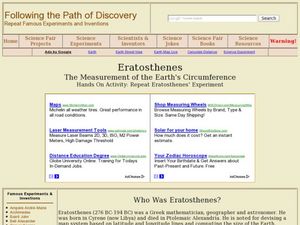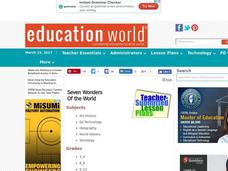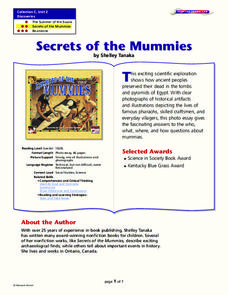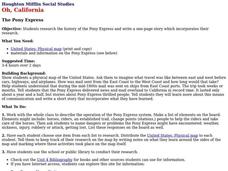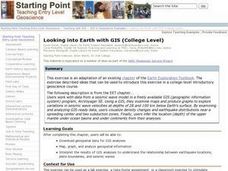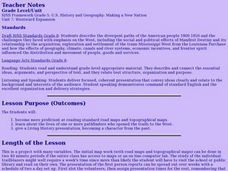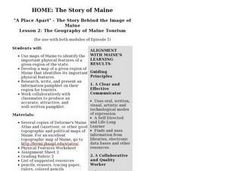Curated OER
Monarch Migration
In this science and geography worksheet, students read a short passage about the migration pattern of the monarch butterfly. Students trace a path on the U.S. map showing the winter and spring migration.
Curated OER
Geography Grid
Fourth graders search a database to find images and scan and affix them on an 8-foot long map of the state of Illinois. They then use it as a basis for discussion.
Curated OER
Exploring and Comparing Other Communities
Third graders search TDC database for images of physical geography maps, weather maps, natural resources maps, and old travel brochures. They create a new travel brochure of an area of their choice using the information they gathered.
Curated OER
Our Earth: Storehouse of Natural Resources
Students listen to an explanation of the science of the mining industry and create a geological map of Africa. They discuss the uses of minerals and resources and research a natural mineral resource in their part of the world.
Curated OER
How Did the Immigrants Get to the United States?
Third graders search TDC database for images of immigration from other countries, maps, and diaries. They identify the challenges that immigrants had to endure to reach the United States.
Curated OER
The Window
Students read a story entitled, "The Window," and discover how some cultures are rejected by others. Students write a letter expressing feelings of rejection and keep a journal of significant events in the story. Using a graphic...
Curated OER
The Debate Over North Shore Road
Students examine the impact of the North Shore Road Project in North Carolina. In this environmental science lesson, students share their views regarding this environmental issue. They compare and contrast the map of the Great Smoky...
Curated OER
THE DIVERSITY OF ARCHITECTURE: HOW HEALTHY IS MY NEIGHBORHOOD?
Learners observe and investigate, on a walking tour, what elements create a healthy neighborhood. They examine the significance of the relationship of the built environment as well as the important details of architecture.
Curated OER
Eratosthenes
Students examine what Eratosthenes is and the history behind him. In this earth lesson students complete a hands on activity to repeat Eratosthenes' experiment.
Curated OER
Seven Wonders of the World
Young scholars recognize "The Seven Wonders of the Ancient World." In this world history lesson, students research various architectures on the Internet and construct a PowerPoint presentation.
Curated OER
Secrets of the Mummies
How did the ancient people of Egypt preserve their dead so well that their bodies are still recognizable today? Learn the painstakingly complex process they used for preservation. Young scholars read and summarize a narrative detailing...
Curated OER
Matthew Henson
Discuss the work of Matthew Henson, an African American who traveled to the North Pole with Robert Peary. After reading the story "Matthew Henson" by Maryann N. Weidt, learners answer questions by drawing inferences and conclusions,...
Curated OER
Elena by Diane Stanley
This story is bound to motivate your class. Learners read a story called Elena by Diane Stanley. The story is about a young woman who marries for love but is soon widowed during the Mexican Revolution. She takes her children to...
Facing History and Ourselves
Social Media and Ferguson
How can social media help or hinder civil dialogue? How can information shared on social media be verified? As the investigation of media reports of the events surrounding the shooting of Michael Brown continues, class members read...
Curated OER
Japanese Influence on Southeast Asia
Students examine the countries occupied by Japan and the influence it had on them. They conduct library research on assigned countries and draw maps of the territory Japan occupied. they give class presentations using Japanese vocabulary.
Curated OER
The Pony Express
Fourth graders reasearch the history of the Pony Express on the internet or they can use books from the school or public library. They write a one-page story which incorporates their research. They share their stories with the class by...
Curated OER
Community Brochures
Second graders research facets of their community in order to create an informational brochure. After brainstorming ideas of what could be included in the brochure, student groups get information from the internet, the library or a...
Curated OER
Looking into Earth with GIS
Students work with data from a seismic wave model in a freely available GIS (geographic information system) program, ArcVoyager SE. Using a GIS, they examine maps and produce graphs to explore variations in seismic wave velocities at...
Curated OER
Where in the World?
Young scholars discover where in the world the very first coins were made through research in small groups using resources available from the library, classroom textbooks, and the Internet.
Curated OER
Mongolia Geography
Students examine the geography and culture of Mongolia. Individually, they cut out cut-outs of animals to place on their maps and label the grasslands and desert areas. They locate major cities and rivers along with vegetation.
Curated OER
Borah Peak Earthquake
students use the internet, an atlas map, and other sources to explore a map of Idaho. They locate the Lost River Range and Mt. Borah. Students read the atlas map to locate earthquake faults, find the magnitude, fault, and epicenter of...
Curated OER
Making A New Nation
Eighth graders read standard road maps and topographical maps, and examine the lives of pathfinders who opened the trails to the West. They develop Living History presentations, role-playing a character from the past.
Curated OER
The Geography of Maine Tourism
Students study topographical maps of Maine to identify the important physical features. They work in groups to create tourism pamphlet highlighting a region of the state.
Curated OER
Cartographer and Journalish as Storytellers
Students collaborate in groups of four students to create a written description of their community during a specific year. They analyze data provided by maps and newspaper articles. They meet as a whole class to discuss their conclusions.








